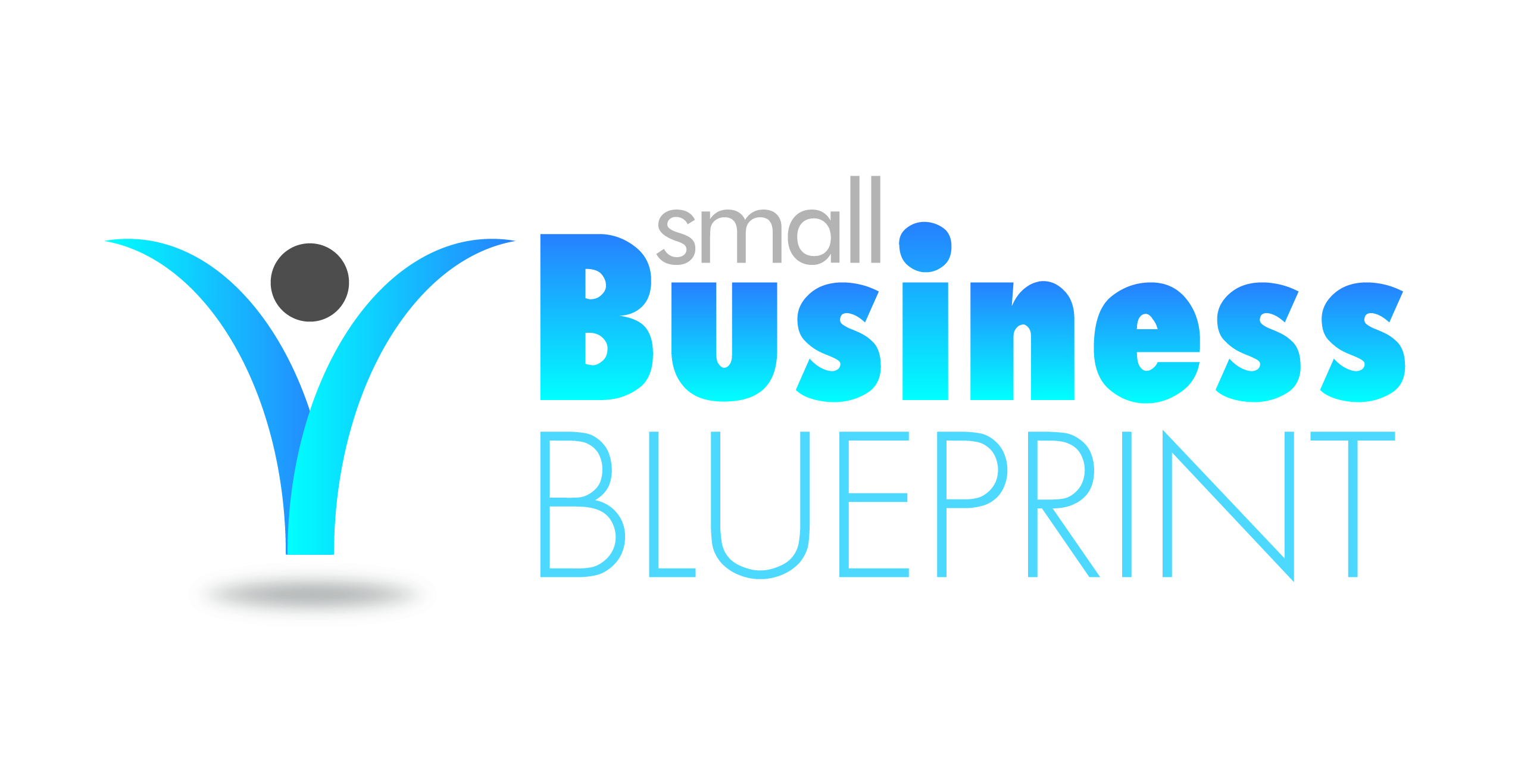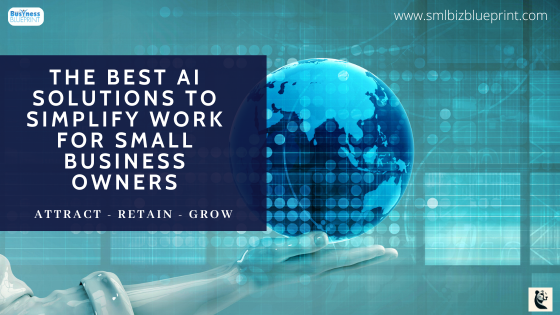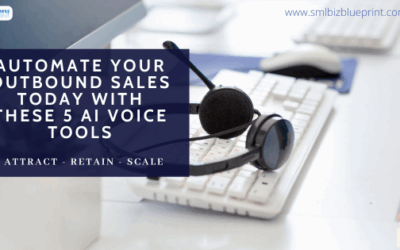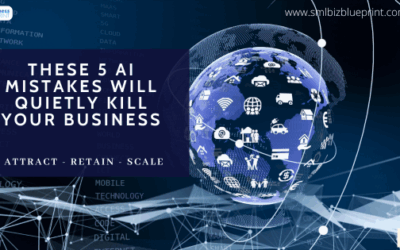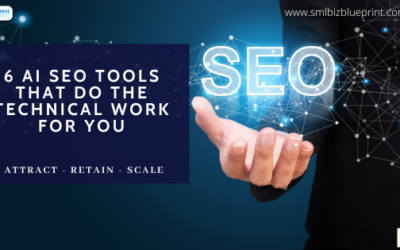Running a small business comes with unique challenges—limited resources, tight budgets, and the constant demand to stay competitive.
In today’s world, leveraging AI tools for small businesses is no longer just an option; it’s necessary. From automating repetitive tasks to delivering personalised customer experiences, AI can revolutionise how small businesses operate.
This guide will explore the top 10 AI solutions to simplify work, boost productivity, and help small businesses thrive.
Whether it’s marketing automation, customer service, project management, or sales, these tools provide practical, affordable, and robust solutions to everyday business challenges.
By the end of this post, you’ll clearly understand how AI can streamline your operations and make your business more efficient—giving you more time to focus on what really matters: growing your business.
Let’s dive in!

#1 Marketing Automation Tools: Amplify Your Reach with Ease
Marketing is the lifeline of any small business, but managing campaigns, emails, and social media can quickly become overwhelming.
This is where AI-powered marketing automation tools step in, simplifying workflows and maximising reach with minimal effort. By automating repetitive tasks and optimising campaigns, these tools free up your time to focus on strategy and creativity.
Top Marketing Automation Tools for Small Businesses
HubSpot
Overview: HubSpot is a comprehensive platform offering marketing, sales, and customer service automation tools. Its AI features help businesses create personalised campaigns, optimise email timing, and analyse performance metrics with precision.
Key Features:
AI-driven email scheduling for peak engagement.
Smart content personalisation to cater to specific audience segments.
Detailed analytics and reports to track marketing ROI.
Pros:
User-friendly interface.
Seamless integration with CRM and sales tools.
Scalable plans for small businesses.
Cons:
Higher-tier plans can be expensive for startups.
May require a learning curve for advanced features.
Ideal Use Cases:
Running email marketing campaigns with personalised content.
Analysing customer behaviour for better targeting.
Streamlining social media posting schedules.
Mailchimp
Overview: Mailchimp is a household name for small businesses seeking affordable and efficient email marketing. Its AI tools go beyond email, helping businesses build customer journeys, optimise subject lines, and recommend products.
Key Features:
AI-powered content recommendations for email campaigns.
Behavioural targeting to reach the right audience.
Comprehensive social media integration.
Pros:
Free plan available for small-scale operations.
Easy-to-use drag-and-drop email editor.
Strong e-commerce integrations.
Cons:
Limited advanced features in the free plan.
Can become costly as your subscriber list grows.
Ideal Use Cases:
Sending newsletters and promotional offers.
Analysing campaign performance with AI insights.
Connecting with audiences across multiple platforms.
ActiveCampaign
Overview: ActiveCampaign offers robust AI features for email and sales automation, making it an excellent choice for small businesses focused on customer engagement. Its predictive content feature helps optimise messaging for higher conversions.
Key Features:
Predictive content and email split testing.
AI-powered customer journey mapping.
Seamless integration with over 850 apps.
Pros:
Affordable pricing plans.
Exceptional customer support.
Advanced automation capabilities.
Cons:
Interface may feel complex for beginners.
Requires some setup time to utilise features fully.
Ideal Use Cases:
Automating follow-up emails after purchases.
Mapping personalised customer journeys.
Tracking lead interactions for targeted campaigns.
When to Choose the Right Tool
HubSpot: Ideal for small businesses seeking an all-in-one solution with scalability.
Mailchimp: Best for those starting or focusing on email marketing.
ActiveCampaign: Perfect for businesses aiming for advanced automation and customer journey mapping.
By integrating these marketing automation tools, small businesses can amplify their reach, enhance customer engagement, and drive measurable growth—all while saving time and effort.
The next step? Finding the tool that aligns with your business goals and start your automation journey today!
#2 Customer Service AI: Delight Your Customers 24/7
Exceptional customer service is the cornerstone of small business success, but maintaining availability and consistency can be challenging.
AI-powered customer service tools offer a solution by handling repetitive inquiries, streamlining support workflows, and improving customer satisfaction without exhausting your team.
Top Customer Service AI Tools for Small Businesses
Zendesk AI
Overview: Zendesk AI enhances traditional customer service software by adding intelligent automation. From chatbots to AI-powered ticketing, Zendesk helps small businesses provide fast, personalised support at scale.
Key Features:
AI-driven chatbots for instant customer responses.
Automated ticket triaging to prioritise high-value queries.
Customer sentiment analysis for improved interactions.
Pros:
Seamless integration with CRM platforms.
Scalable plans tailored for small businesses.
Powerful analytics to track performance.
Cons:
Some advanced features require premium plans.
Setup may require technical knowledge.
Ideal Use Cases:
Handling common FAQs via chatbots.
Managing customer inquiries across email, chat, and social media.
Identifying recurring customer pain points with AI insights.
Intercom
Overview: Intercom combines AI with live chat to offer a hybrid approach to customer support. Its AI bots can answer routine questions, collect customer data, and escalate complex issues to human agents.
Key Features:
AI-powered chatbots for proactive support.
Customisable workflows to meet unique business needs.
Automated follow-ups for unresolved tickets.
Pros:
User-friendly interface with minimal learning curve.
Offers a balance of AI and human interaction.
Integrates seamlessly with sales and marketing tools.
Cons:
Pricing can be steep for small teams.
Limited analytics on lower-tier plans.
Ideal Use Cases:
Onboarding new customers with guided AI bots.
Proactively reaching out to users based on their behaviour.
Supporting high-traffic e-commerce websites.
ChatGPT API
Overview: OpenAI’s ChatGPT API enables businesses to create custom conversational AI solutions for their websites, apps, and support channels. Its versatility makes it a powerful tool for handling customer interactions.
Key Features:
Highly customisable conversational AI.
Ability to integrate into websites, apps, or messaging platforms.
Generates natural, human-like responses to customer queries.
Pros:
Flexible and scalable to fit various business needs.
Affordable pricing compared to pre-packaged solutions.
Can be trained on your business-specific knowledge base.
Cons:
Requires technical expertise to set up and manage.
No pre-built CRM integration.
Ideal Use Cases:
Creating an interactive FAQ section on your website.
Offering personalised product recommendations through chat.
Automating customer feedback collection.
When to Choose the Right Tool
Zendesk AI: Ideal for small businesses with high support volumes needing robust ticketing and analytics.
Intercom: Perfect for businesses looking to balance AI automation with human touch.
ChatGPT API: Best for custom solutions tailored to specific business needs and customer interactions.
With these AI tools, small businesses can provide exceptional customer service that’s available around the clock.
Whether automating routine tasks or delighting customers with personalised responses, AI ensures that your business remains responsive, efficient, and customer-focused.
Ready to transform your support experience? Start exploring these tools today!
#3 Project Management Solutions: Stay on Track, Stress-Free
Managing multiple tasks, deadlines, and team collaborations can quickly overwhelm small businesses. AI-powered project management tools help streamline workflows, improve communication, and ensure nothing slips through the cracks.
By automating repetitive tasks and providing predictive insights, these tools keep your team focused and productive.
Top AI-Powered Project Management Tools for Small Businesses
Trello AI
Overview: Trello, a popular project management platform, integrates AI features to enhance task organisation and team collaboration. Its user-friendly interface and automation tools make it ideal for small businesses juggling multiple projects.
Key Features:
AI-powered task prioritisation based on deadlines and importance.
Smart suggestions for task assignments.
Integration with other tools like Slack, Google Drive, and Asana.
Pros:
Visual, drag-and-drop Kanban boards.
Easy to use, even for non-technical teams.
Customisable workflows for unique business needs.
Cons:
Limited advanced features in the free version.
Not ideal for complex project tracking.
Ideal Use Cases:
Managing marketing campaigns or content calendars.
Tracking progress on client deliverables.
Collaborating on team-wide projects with clear task assignments.
Asana
Overview: Asana leverages AI to help teams coordinate tasks, set priorities, and monitor real-time project progress. Its predictive features help identify potential bottlenecks before they impact deadlines.
Key Features:
Automated task reminders and deadline notifications.
Predictive analytics for project timelines.
AI-generated insights on team productivity trends.
Pros:
Versatile for both simple and complex projects.
Integrates well with popular apps like Microsoft Teams and Zoom.
Detailed reporting and analytics.
Cons:
Can feel overwhelming for smaller teams with basic needs.
Higher-tier plans can be pricey for startups.
Ideal Use Cases:
Coordinating tasks for remote teams.
Planning and executing multi-step projects.
Tracking team workloads to avoid burnout.
Monday.com
Overview: Monday.com offers a visually appealing platform with AI tools that help teams plan, execute, and track projects efficiently. Its adaptability makes it suitable for a wide range of industries.
Key Features:
AI-driven task scheduling and resource allocation.
Automated notifications for task dependencies.
Real-time collaboration tools for seamless team communication.
Pros:
Highly customisable boards for different workflows.
Robust integrations with tools like Salesforce and Shopify.
Excellent customer support and onboarding resources.
Cons:
Can be costly for smaller teams.
Advanced features may require training to be used effectively.
Ideal Use Cases:
Planning product launches with multiple stakeholders.
Managing supply chains or vendor relationships.
Tracking deliverables across distributed teams.
When to Choose the Right Tool
Trello AI: Perfect for businesses needing simple, visual task management with basic AI features.
Asana: Best for teams requiring in-depth project tracking and predictive analytics.
Monday.com: Ideal for businesses seeking a customisable, scalable solution for complex workflows.
By adopting these AI-powered project management tools, small businesses can ensure projects are completed on time and teams remain productive.
Whether coordinating a remote workforce or managing tight deadlines, these solutions are designed to keep your operations running smoothly.
Ready to take control of your projects? Choose the tool that fits your workflow, and start optimising today!
Get the Tools for Success
Don’t just read about growth—achieve it! Join our newsletter for exclusive tips, tools, and strategies to take your business to the next level.
Join Today
#4 AI-Powered Analytics: Make Data-Driven Decisions Faster
In today’s data-driven world, small businesses generate vast amounts of information—from customer preferences to sales trends. AI-powered analytics tools help transform raw data into actionable insights, enabling smarter decisions and improving overall business performance.
These tools save time, minimise guesswork, and unlock growth opportunities by identifying patterns and predicting future trends.
Top AI-Powered Analytics Tools for Small Businesses
Tableau
Overview: Tableau is a leading data visualisation tool incorporating AI to help businesses analyse and present data effectively. Its intuitive dashboards and predictive capabilities make it a favourite for small businesses looking to leverage data insights.
Key Features:
AI-driven insights and trend analysis.
User-friendly drag-and-drop interface for building reports.
Integration with multiple data sources, including spreadsheets, databases, and cloud services.
Pros:
Highly customisable visualisations.
Ideal for both technical and non-technical users.
Scalable plans to fit various business sizes.
Cons:
Advanced features can be pricey.
May require training to maximise potential.
Ideal Use Cases:
Identifying sales trends across regions or products.
Monitoring marketing campaign performance.
Creating detailed, shareable dashboards for stakeholders.
Google Analytics AI
Overview: Google Analytics is a staple for businesses managing online presence, and its AI features take website and marketing analysis to the next level. From traffic predictions to audience behaviour insights, it helps businesses optimise their online strategies.
Key Features:
AI-driven alerts for unusual traffic spikes or drops.
Advanced segmentation to analyse user behaviour.
Predictive metrics like purchase probability and churn likelihood.
Pros:
Free for small businesses with basic needs.
Seamless integration with Google Ads and other platforms.
Easy-to-understand interface with robust features.
Cons:
Advanced capabilities require expertise.
May not be as effective for offline business data.
Ideal Use Cases:
Tracking website performance and user engagement.
Optimising digital ad spend with conversion insights.
Understanding customer journeys to improve UX design.
Looker
Overview: Looker, part of Google Cloud, empowers businesses with AI-powered business intelligence and data visualisation. Its strength lies in consolidating data from multiple sources and presenting actionable insights.
Key Features:
AI-driven predictions and actionable suggestions.
Highly customisable dashboards tailored to specific business needs.
Real-time data integration from multiple platforms.
Pros:
Excellent for businesses with diverse data sources.
Scalable for growing businesses.
Strong focus on real-time data accuracy.
Cons:
Higher cost compared to simpler analytics tools.
May require technical expertise for initial setup.
Ideal Use Cases:
Analysing e-commerce performance across multiple channels.
Forecasting inventory needs based on sales trends.
Monitoring key performance indicators (KPIs) in real time.
When to Choose the Right Tool
Tableau: Perfect for businesses seeking robust data visualisation and deep analysis.
Google Analytics AI: Best for those focused on website and digital marketing performance.
Looker: Ideal for businesses needing comprehensive real-time analytics across multiple data sources.
With AI-powered analytics tools, small businesses can make data-driven decisions confidently and efficiently. Whether understanding customer behaviour, forecasting trends, or optimising marketing strategies, these tools empower you to turn raw data into actionable insights.
Ready to supercharge your decision-making? Start exploring these tools and see the difference they make!
#5 Content Creation Tools: Create Stunning Content in Seconds
Small businesses must create high-quality content to engage audiences, build brand awareness, and drive conversions. However, content creation can be time-consuming and resource-intensive.
AI-powered content creation tools help small businesses produce professional-grade content quickly and efficiently—whether it’s social media posts, blog articles, or marketing visuals.
Top AI-Powered Content Creation Tools for Small Businesses
Canva AI
Overview: Canva has revolutionised graphic design for non-designers, and its AI-powered features make it even more powerful. With AI tools for image generation, layout suggestions, and text-to-design functionality, Canva simplifies creating stunning visuals.
Key Features:
Magic Design: AI suggests templates based on your content.
Text-to-Image tool for generating custom graphics.
Social media scheduler to post content directly from Canva.
Pros:
Easy-to-use drag-and-drop interface.
Vast library of templates and assets.
Affordable plans tailored for small businesses.
Cons:
Limited advanced editing options compared to professional design software.
Some premium features require a paid plan.
Ideal Use Cases:
Designing social media posts, flyers, or presentations.
Creating visually appealing marketing materials quickly.
Generating custom visuals for campaigns.
Jasper AI
Overview: Jasper AI is a powerful writing assistant that helps businesses generate high-quality written content quickly. It’s ideal for creating blog posts, email copy, social media captions, and more.
Key Features:
AI-driven content generation tailored to tone and audience.
Pre-built templates for blog posts, ads, and emails.
Integration with Grammarly for flawless writing.
Pros:
Saves significant time on content creation.
Supports multiple languages and tones.
Great for brainstorming and overcoming writer’s block.
Cons:
Can produce generic content without proper prompts.
Requires editing to ensure a unique brand voice.
Ideal Use Cases:
Writing SEO-optimized blog posts.
Crafting engaging ad copy.
Generating ideas for content marketing campaigns.
Grammarly
Overview: Grammarly is more than a spell checker—it’s an AI-powered writing assistant that helps businesses refine their content with grammar, tone, and style suggestions.
Key Features:
Advanced grammar and spell-checking capabilities.
AI-driven tone detection to align with your audience.
Suggestions for concise, clear, and engaging writing.
Pros:
Easy to use, even for non-native English speakers.
Real-time suggestions while typing.
Integrates with platforms like Google Docs and email.
Cons:
Premium features require a subscription.
Limited creative writing suggestions.
Ideal Use Cases:
Editing emails, blog posts, or reports.
Ensuring professional communication with clients.
Polishing content for publication.
When to Choose the Right Tool
Canva AI: Ideal for businesses focused on visual content creation for social media and marketing.
Jasper AI: Perfect for generating written content quickly and overcoming writer’s block.
Grammarly: Best for refining and polishing written content to maintain a professional tone.
Supporting Statistics
By adopting these AI content creation tools, small businesses can create stunning visuals and compelling copy in a fraction of the time. Whether you’re looking to produce engaging social media posts or professional marketing materials, these tools are here to simplify the process.
Ready to elevate your content game? Start exploring these tools today!
#6 Sales Automation Tools: Turn Leads into Loyal Customers
Managing leads, tracking sales, and closing deals can be labour-intensive for small businesses. AI-powered sales automation tools streamline these tasks, allowing you to focus on building relationships and driving revenue.
By automating follow-ups, prioritising leads, and providing actionable insights, these tools help small businesses convert prospects into loyal customers more efficiently.
Top AI-Powered Sales Automation Tools for Small Businesses
Salesforce Einstein
Overview: Salesforce Einstein is an AI-driven sales assistant built into the Salesforce CRM platform. It helps businesses identify high-value leads, automate routine tasks, and predict customer behaviour.
Key Features:
AI-driven lead scoring and prioritisation.
Predictive analytics for sales forecasting.
Automated follow-ups and reminders.
Pros:
Seamlessly integrates with Salesforce’s CRM ecosystem.
Provides actionable insights for better decision-making.
Customisable dashboards for tracking sales performance.
Cons:
Expensive for smaller businesses with limited budgets.
Requires familiarity with Salesforce to maximise potential.
Ideal Use Cases:
Identifying and targeting high-value leads.
Forecasting sales trends to improve strategy.
Automating routine follow-ups for better productivity.
Zoho CRM AI
Overview: Zoho CRM leverages AI to help small businesses streamline their sales processes. Its AI assistant, Zia, offers lead predictions, automated workflows, and sales insights.
Key Features:
Zia, an AI-powered sales assistant, analyses customer data for actionable insights.
Automation of repetitive tasks like email follow-ups and data entry.
Lead scoring based on customer engagement and behaviour.
Pros:
Affordable pricing plans for small businesses.
User-friendly interface with minimal learning curve.
Integrates with Zoho’s suite of business tools.
Cons:
Advanced features may require paid add-ons.
Limited customisation compared to more expensive solutions.
Ideal Use Cases:
Managing and scoring leads efficiently.
Automating sales pipelines to reduce manual effort.
Tracking sales metrics for continuous improvement.
Pipedrive Smart AI
Overview: Pipedrive is a sales-focused CRM platform that integrates AI tools to help businesses track deals, manage leads, and automate sales processes. Its simplicity and AI-driven insights make it ideal for small businesses.
Key Features:
AI-powered deal tracking and management.
Workflow automation to save time on repetitive tasks.
Sales insights and performance tracking to optimise strategies.
Pros:
Intuitive interface tailored for sales teams.
Affordable plans for small businesses.
Mobile app for on-the-go sales management.
Cons:
Fewer integrations compared to competitors.
Limited advanced analytics.
Ideal Use Cases:
Tracking deals and sales pipelines in real time.
Automating sales activities like follow-ups and reminders.
Monitoring team performance for goal alignment.
When to Choose the Right Tool
Salesforce Einstein: Ideal for businesses already using Salesforce, focusing on advanced analytics and lead prioritisation.
Zoho CRM AI: Perfect for small businesses seeking affordable, easy-to-use automation features.
Pipedrive Smart AI: Best for businesses with a sales-centric approach looking for simple yet effective deal management.
By leveraging these sales automation tools, small businesses can streamline their sales processes, improve team productivity, and ultimately boost revenue.
Whether you need help managing leads, automating follow-ups, or predicting customer behaviour, these AI solutions have you covered.
Ready to close more deals? Choose the tool that fits your sales strategy, and start automating today!

#7 Accounting and Finance AI: Simplify Your Books
Managing finances can be a daunting task for small businesses, often requiring meticulous attention to detail and significant time investment. AI-powered accounting and finance tools take the stress out of bookkeeping, invoicing, and financial planning.
By automating repetitive tasks and providing real-time insights, these tools help small businesses maintain financial health and focus on growth.
Top AI-Powered Accounting and Finance Tools for Small Businesses
QuickBooks AI
Overview: QuickBooks is a trusted name in small business accounting, and its AI features make it even more efficient. QuickBooks simplifies day-to-day financial management with automated expense tracking, invoicing, and financial forecasting.
Key Features:
Automated categorisation of expenses and income.
AI-powered cash flow forecasting.
Real-time tax calculations and preparation.
Pros:
User-friendly interface for non-accountants.
Scalable plans for growing businesses.
Strong integration with other business tools like PayPal and Shopify.
Cons:
Limited features in the basic plan.
Advanced reporting tools may require additional costs.
Ideal Use Cases:
Tracking income and expenses automatically.
Generating financial reports for stakeholders.
Simplifying tax preparation and compliance.
Xero
Overview: Xero is another popular accounting tool incorporating AI to streamline financial management. It offers robust automation features for invoicing, payroll, and bank reconciliations.
Key Features:
AI-driven bank reconciliation for seamless financial tracking.
Automated invoicing and payment reminders.
Real-time financial dashboards for quick insights.
Pros:
Intuitive, modern interface.
Excellent customer support and resources.
Affordable pricing plans for small businesses.
Cons:
Limited inventory management features.
Payroll features require additional subscriptions in some regions.
Ideal Use Cases:
Managing accounts payable and receivable.
Reconciling bank transactions with ease.
Generating accurate, real-time financial reports.
FreshBooks AI
Overview: FreshBooks specialises in invoicing and time tracking, making it an excellent choice for freelancers and service-based small businesses. Its AI features simplify billing and financial monitoring, ensuring timely payments.
Key Features:
Automated invoicing with payment tracking.
AI-powered expense categorisation.
Insights into profitability and project costs.
Pros:
Easy-to-use platform with mobile app support.
Ideal for service-based businesses like consultants or freelancers.
Affordable pricing tailored for small operations.
Cons:
Limited integrations compared to competitors.
Less robust for larger businesses with complex needs.
Ideal Use Cases:
Automating billing and ensuring timely payments.
Tracking profitability of individual projects.
Monitoring expenses for better financial control.
When to Choose the Right Tool
QuickBooks AI: Best for small businesses seeking a comprehensive accounting tool with strong forecasting capabilities.
Xero: Ideal for businesses requiring seamless bank reconciliation and real-time financial dashboards.
FreshBooks AI: Perfect for freelancers and service-based businesses focused on invoicing and time tracking.
By adopting these AI-powered accounting tools, small businesses can streamline financial management, reduce errors, and gain better control over their finances. Whether automating bookkeeping or generating insightful reports, these tools free up time to focus on growing your business.
Ready to simplify your books? Choose the tool that fits your needs and take the hassle out of accounting today!
#8 HR and Recruitment Tools: Hire Smarter, Not Harder
Hiring the right talent and managing HR processes can be time-consuming for small businesses. AI-powered HR and recruitment tools streamline everything from sourcing candidates to onboarding employees.
By automating repetitive tasks and providing insights into candidate suitability, these tools make it easier for small businesses to build strong, efficient teams.
Top AI-Powered HR and Recruitment Tools for Small Businesses
BambooHR AI
Overview: BambooHR is an all-in-one HR management platform with AI features to streamline hiring, onboarding, and employee engagement. It’s designed with small businesses in mind, offering tools that make HR less complex and more efficient.
Key Features:
AI-driven applicant tracking system (ATS) for faster hiring.
Automated onboarding workflows to welcome new hires.
Employee satisfaction surveys with AI-powered analysis.
Pros:
User-friendly interface is suitable for small teams.
Excellent customer support.
Customisable workflows to match business needs.
Cons:
Limited integrations with third-party tools.
Some features are locked behind higher-tier plans.
Ideal Use Cases:
Streamlining the hiring process with an AI-powered ATS.
Automating repetitive HR tasks like benefits enrollment.
Gaining insights into employee satisfaction and retention.
Workable
Overview: Workable is a robust AI-powered recruitment platform that simplifies candidate sourcing, screening, and interviewing. It’s particularly well-suited for small businesses looking to expand their teams efficiently.
Key Features:
AI-assisted candidate sourcing from multiple platforms.
Automated candidate screening based on skills and experience.
Interview scheduling with minimal manual effort.
Pros:
Broad reach for sourcing candidates from job boards and social platforms.
Streamlined workflows for hiring teams.
Strong reporting features for tracking recruitment performance.
Cons:
Pricing can be high for smaller teams.
Less focus on broader HR management beyond recruitment.
Ideal Use Cases:
Hiring skilled candidates quickly for growth-focused roles.
Managing high volumes of applications efficiently.
Tracking the success of recruitment campaigns.
LinkedIn Recruiter AI
Overview: LinkedIn Recruiter leverages AI to help businesses find and connect with top talent. Its advanced filters and AI recommendations make it a go-to tool for small businesses seeking specialised candidates.
Key Features:
AI-driven candidate recommendations based on job descriptions.
Advanced search filters for skills, experience, and location.
Automated outreach templates to connect with candidates quickly.
Pros:
Access to LinkedIn’s extensive professional network.
AI helps identify passive candidates who aren’t actively job hunting.
Integration with LinkedIn Learning for employee development.
Cons:
Subscription costs may be high for smaller budgets.
Limited features for managing internal HR processes.
Ideal Use Cases:
Finding niche or highly specialised candidates.
Building a talent pipeline for future hiring needs.
Sourcing candidates who align with company culture and goals.
When to Choose the Right Tool
BambooHR AI: Best for small businesses looking for an all-in-one HR and recruitment solution.
Workable: Ideal for businesses focusing solely on hiring with streamlined recruitment workflows.
LinkedIn Recruiter AI: Perfect for sourcing niche candidates and building professional networks.
With AI-powered HR and recruitment tools, small businesses can simplify hiring, improve employee satisfaction, and build a strong, motivated workforce.
Whether you’re looking to automate onboarding or find top talent faster, these tools are designed to save you time and money.
Ready to strengthen your team? Start exploring these AI tools today and see the difference they make!
#9 Cybersecurity Solutions: Protect Your Business with AI
Cybercriminals increasingly target small businesses, yet many lack the resources for robust security measures. AI-powered cybersecurity tools offer an affordable and effective way to safeguard sensitive data, detect threats, and protect your operations from costly breaches.
These tools use machine learning and automation to identify vulnerabilities and respond to threats in real time, giving small businesses peace of mind.
Top AI-Powered Cybersecurity Tools for Small Businesses
Darktrace
Overview: Darktrace is a leading AI-driven cybersecurity platform that detects and responds to threats in real time. Its self-learning AI adapts to your business environment, identifying unusual activity and stopping cyberattacks before they cause harm.
Key Features:
AI-powered anomaly detection to spot potential threats.
Autonomous response capabilities to neutralise attacks.
Real-time dashboards for monitoring cybersecurity health.
Pros:
Comprehensive protection against advanced threats.
Minimal manual intervention is required.
Adapts to evolving security risks.
Cons:
Expensive for very small businesses.
Requires some technical expertise to manage effectively.
Ideal Use Cases:
Protecting sensitive customer and financial data.
Detecting and neutralising phishing and ransomware attacks.
Monitoring network activity for unusual behaviour.
CrowdStrike Falcon
Overview: CrowdStrike Falcon is a cloud-based AI cybersecurity tool designed to prevent, detect, and respond to cyber threats. Its lightweight design makes it a popular choice for small businesses with limited IT infrastructure.
Key Features:
AI-driven threat detection and endpoint protection.
Real-time monitoring and reporting.
Automated incident response workflows.
Pros:
Easy to deploy and manage.
Scalable for growing businesses.
Strong focus on endpoint protection.
Cons:
May require additional IT resources for customisation.
Higher-tier features can be costly.
Ideal Use Cases:
Protecting devices used for remote work.
Preventing malware and ransomware attacks.
Gaining insights into potential vulnerabilities.
Norton Small Business
Overview: Norton Small Business provides AI-powered protection against cyber threats, tailored specifically for small businesses. It offers device security, data encryption, and real-time threat detection.
Key Features:
AI-driven malware and virus detection.
Secure file sharing with encryption.
Real-time protection for devices and networks.
Pros:
Affordable pricing for small business budgets.
Easy to use, even without IT expertise.
Covers multiple devices with a single subscription.
Cons:
Limited features compared to enterprise-level solutions.
May not support advanced threat-hunting capabilities.
Ideal Use Cases:
Providing basic protection for small business networks.
Ensuring secure communication with clients.
Protecting against common cyber threats like phishing.
When to Choose the Right Tool
Darktrace: Ideal for businesses needing advanced, real-time threat detection and response.
CrowdStrike Falcon: Best for small businesses seeking strong endpoint protection and scalability.
Norton Small Business: Perfect for startups or businesses needing basic, budget-friendly cybersecurity.
Small businesses can protect themselves against ever-evolving cyber threats by leveraging AI-powered cybersecurity solutions.
Whether you are looking for advanced protection or basic safeguards, these tools are designed to keep your operations secure.
Ready to enhance your cybersecurity? Choose the tool that fits your needs and take a proactive approach to protecting your business today!
Take the Pulse of Your Business Growth
Ready to scale smarter?
Join Pulse and gain access to expert insights, actionable automations, and AI tutorials that will transform your business operations.
#10 AI for Inventory Management: Optimize Stock with Precision
Managing inventory efficiently is critical for small businesses to avoid stockouts, reduce overstocking, and minimise costs.
AI-powered inventory management tools leverage machine learning and predictive analytics to optimise stock levels, track inventory in real time, and streamline supply chain operations. These tools empower small businesses to make data-driven decisions, saving time and money.
Top AI-Powered Inventory Management Tools for Small Businesses
NetSuite AI
Overview: NetSuite’s inventory management software integrates AI to provide real-time inventory tracking and demand forecasting. This cloud-based tool is ideal for small businesses looking to optimise their supply chain.
Key Features:
AI-driven demand forecasting to reduce overstock and stockouts.
Real-time inventory tracking across multiple locations.
Automated reordering based on stock levels and sales trends.
Pros:
Scalable solution for growing businesses.
Comprehensive features that integrate with ERP and CRM.
Excellent reporting and analytics capabilities.
Cons:
May be expensive for very small businesses.
Requires training for advanced features.
Ideal Use Cases:
Managing inventory across physical stores and online channels.
Predicting seasonal demand fluctuations.
Automating reorders to maintain optimal stock levels.
TradeGecko (Now QuickBooks Commerce)
Overview: TradeGecko, now integrated into QuickBooks Commerce, is an AI-driven inventory management platform for small and medium-sized businesses. Its features simplify inventory tracking and order fulfilment.
Key Features:
Automated stock adjustments and reordering.
AI-powered demand planning and forecasting.
Centralised inventory management across sales channels.
Pros:
Easy integration with QuickBooks and other tools.
User-friendly dashboard for tracking inventory and orders.
Affordable for small businesses.
Cons:
Limited advanced features compared to larger platforms.
Focused primarily on businesses already using QuickBooks.
Ideal Use Cases:
Synchronising inventory across online and offline sales channels.
Automating order fulfilment and stock adjustments.
Planning inventory for seasonal sales spikes.
inFlow AI
Overview: inFlow is a small business-friendly inventory management tool that uses AI to track stock levels, manage purchase orders, and analyse inventory performance. It’s beneficial for businesses with limited resources.
Key Features:
AI-powered reorder suggestions to prevent stockouts.
Barcode scanning for efficient stock management.
Detailed inventory performance reports.
Pros:
Affordable plans designed for small businesses.
Simple setup and user-friendly interface.
Strong mobile app support for on-the-go inventory management.
Cons:
Limited scalability for larger businesses.
Advanced features may require additional costs.
Ideal Use Cases:
Managing inventory for small retail or wholesale businesses.
Tracking sales trends to optimise stock levels.
Streamlining inventory processes with mobile tools.
When to Choose the Right Tool
NetSuite AI: Ideal for businesses needing a comprehensive, scalable solution for complex inventory needs.
TradeGecko/QuickBooks Commerce: Best for small businesses already using QuickBooks and managing multi-channel sales.
inFlow AI: Perfect for startups or businesses seeking an affordable, easy-to-use inventory management tool.
Whether managing a small retail store or a growing e-commerce business, these tools help you stay one step ahead of demand.
Ready to optimise your inventory?
Start with one of these tools today and see the results for yourself!
Conclusion
Running a small business is no easy task, but with the right tools, you can simplify operations, improve efficiency, and focus on what truly matters—growing your business.
This guide explored 10 powerful AI solutions that help small businesses streamline tasks, from marketing automation and customer service to inventory management and cybersecurity.
By integrating these tools into your business, you can:
- Save Time: Automate repetitive tasks like email campaigns, invoicing, and data analysis.
- Boost Efficiency: Leverage AI-powered insights to make smarter, faster decisions.
- Enhance Customer Satisfaction: Use AI to provide personalised, 24/7 support.
- Secure Your Business: Protect sensitive data and operations with AI-driven cybersecurity.
Whether you’re a freelancer, a retailer, or a service-based business, AI tools are designed to fit your unique needs and budget.
Now is the time to embrace the transformative power of AI and gain a competitive edge in your industry.
Ready to Get Started?
Take the first step toward simplifying your work and boosting productivity. Explore these AI tools today.
FAQs
Q1: What are AI tools, and how can they benefit small businesses?
A1: AI tools are software applications that use artificial intelligence to automate tasks, analyse data, and make predictions. For small businesses, they can save time, reduce costs, and improve decision-making by handling repetitive tasks, providing insights, and streamlining operations.
Q2: Are AI tools expensive for small businesses?
A2: Many AI tools offer affordable pricing plans tailored for small businesses, with some even providing free or trial versions. Tools like Mailchimp, Grammarly, and inFlow AI are budget-friendly options that still deliver significant value.
Q3: How do I choose the right AI tool for my business?
A3: Start by identifying your business’s specific needs—whether it’s improving marketing, automating sales, managing inventory, or enhancing customer service. Research tools in that category, compare features and consider factors like cost, scalability, and ease of use before making a decision.
Q4: Can AI tools integrate with the software I already use?
A4: Most AI tools are designed to integrate seamlessly with popular platforms like CRM, ERP, and e-commerce software. For example, tools like HubSpot, QuickBooks, and Zoho CRM offer integrations with third-party apps to create a cohesive workflow.
Q5: Are AI tools difficult to implement?
A5: Many AI tools are user-friendly and come with setup guides or customer support to ease the implementation process. Cloud-based solutions like Canva AI or Grammarly require minimal technical expertise, making them ideal for small businesses.
Q6: Can AI tools really improve customer satisfaction?
A6: Yes! AI tools like Zendesk AI and Intercom provide 24/7 customer support through chatbots, automate follow-ups, and analyse customer sentiment to deliver more personalised and timely responses, significantly enhancing customer satisfaction.
Q7: Are AI tools secure for handling sensitive business data?
A7: Reputable AI tools prioritise data security and comply with industry standards like GDPR and SOC 2. Tools like Darktrace and CrowdStrike Falcon are specifically designed to safeguard sensitive business and customer information from cyber threats.
Q8: Will using AI tools replace human employees?
A8: AI tools are designed to complement human efforts, not replace them. They handle repetitive, time-consuming tasks, allowing your team to focus on strategic, creative, and relationship-building activities that require human expertise.
Other Articles
How AI Agents Simplify Analytics for Small Businesses
